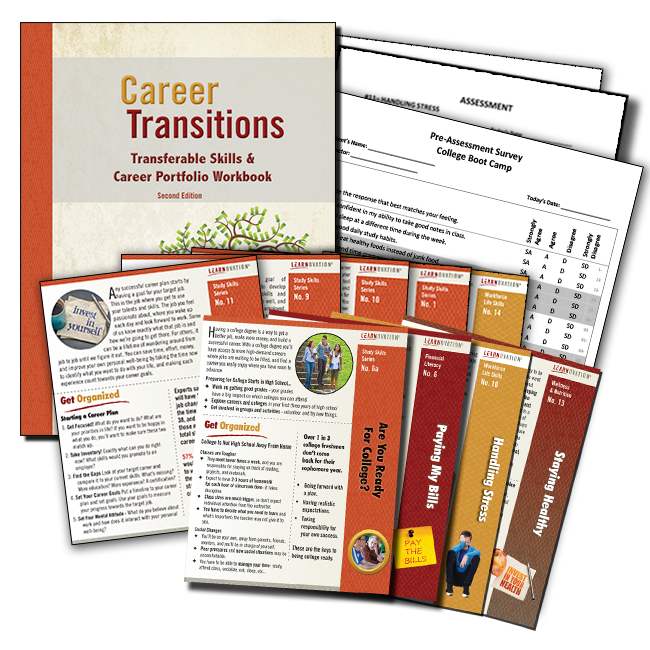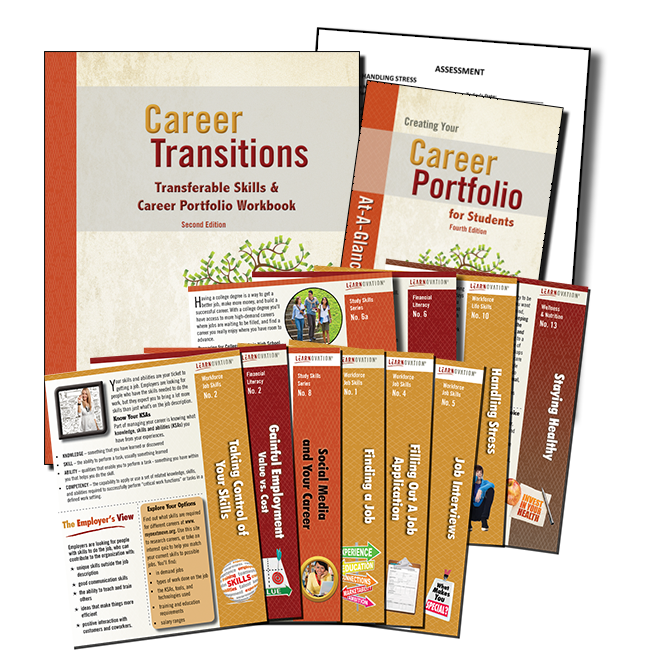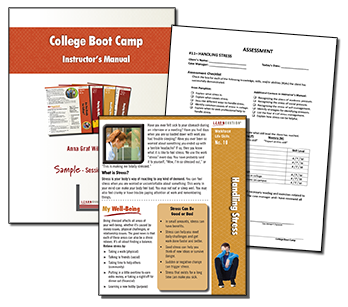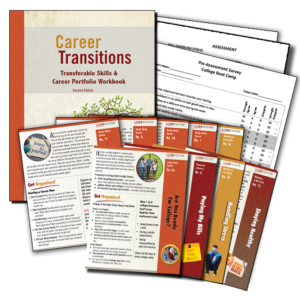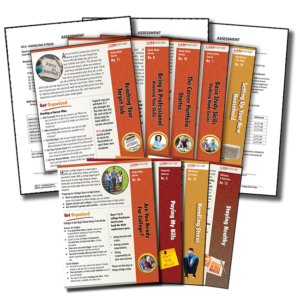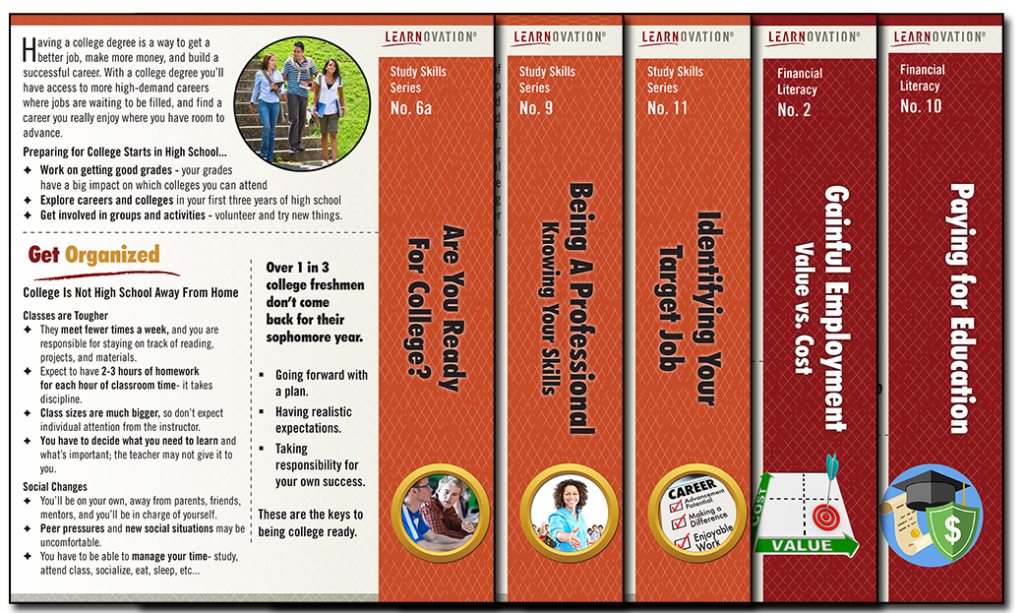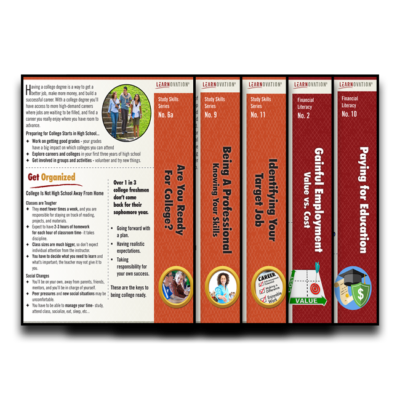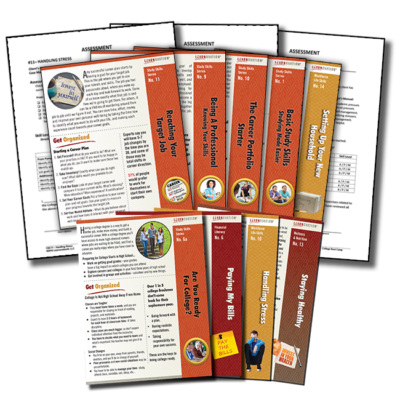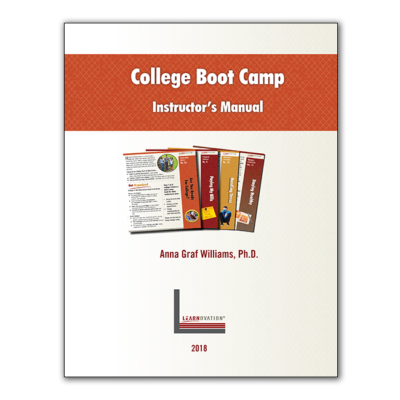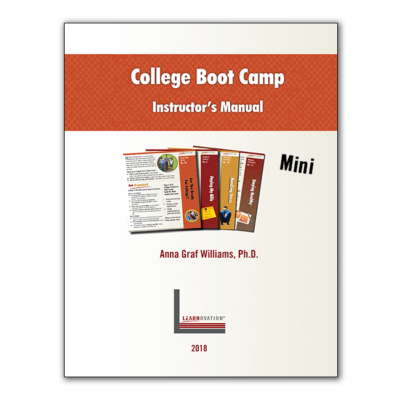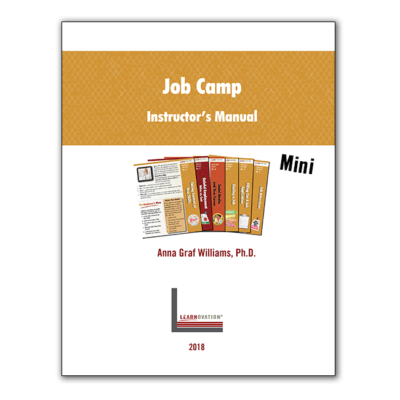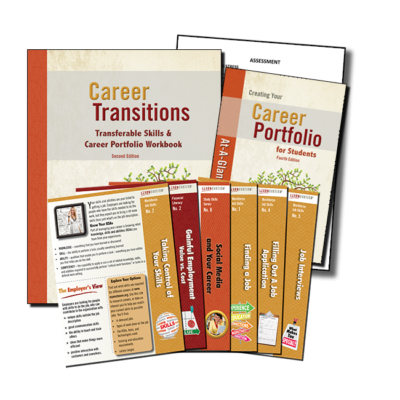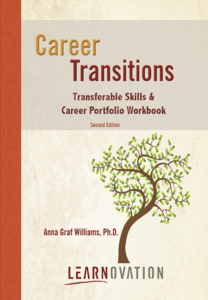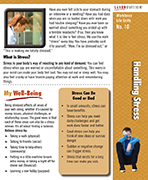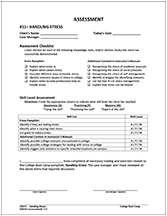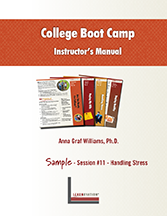Boot Camp & Job Camp
Job Skills & Adulting Skills Students Need to Be IndependentSet up your own Adulting/ College Boot Camp and Job Camp program and jump start your students for success!
Adulting/ College Boot Camp
Help students develop the survival skills they need to succeed independently on their own.
Job Camp
Ready to build a career? Give students the practical skills they need to succeed on the job.
The Adulting/College Boot Camp and Job Camp programs are designed to promote student independence and job preparation!
Prepare students for college and work experience.
Set up micro-burst sessions where students develop the skills they need to succeed independently at college and in the workplace. Use for year-round programs or summer intensives.


Take the Guesswork out of Instruction
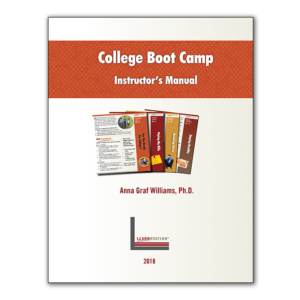 Each camp has a companion Instructor’s Guide- designed to provide the training details on the 15 sessions in the camp. PowerPoint decks, additional activities and handouts and detailed training guidelines get your staff up and running fast and takes the guess work out of instruction.
Each camp has a companion Instructor’s Guide- designed to provide the training details on the 15 sessions in the camp. PowerPoint decks, additional activities and handouts and detailed training guidelines get your staff up and running fast and takes the guess work out of instruction.
Adulting/College Boot Camp
Boot Camp
15 1-hour modules
Materials used include:
Nine targeted pamphlets from our various pamphlet series.
A variety of handouts and exercises found in our detailed Instructor’s Manual to supplement the session topic.
Exercises from The College Prep Workbook – a skills-focused workbook used to identify and document personal skills.
As a supplement, we recommend Creating Your Career Portfolio At-A-Guide for Students, 4th Ed.– Designed to help student create a personal career portfolio to document their skills throughout their college career and beyond.
Click to view samples of the College Boot Camp session #11- Handling Stress
Don’t have time for a full boot camp or job camp?
Try the Mini Camps!
Boot Camp Sessions
#1 - Welcome to the Workplace!
- Overview of Job Camp
- What’s in it for me
- What you’ll create
- Intro to the materials
- Introduction to Career Portfolios
- Interest Inventories
#2 – What Work Style Suits Me?
- Interest inventory – what did you learn?
- Types of jobs
- Types of work environments
- Intro to skills
- Top jobs – do you agree with your assessment?
- Researching the Job – Exploring O*NET
#3 – What Employers Expect
- The employer’s view
- What does it mean to be a professional?
- Workplace skills
- Technical skills
- Soft Skills
- Transferable skills
- Gaining skills on the job
- Job shadowing
- A Players
- Skills from jobs
#4 – Job Applications
- What to expect on an application
- Tips for filling out a job application online and in person.
- Information on the application
- Collecting your information for a job application
- Assessment tests
#5– What Do You Have to Offer?
- What to expect on an application
- Tips for filling out a job application online and in person.
- Information on the application
- Collecting your information for a job application
- Assessment tests
#6– Financial Independence
- The basics of budgeting
- Getting paid in skills
- Costs of a job- transportation, uniforms
- Creating a basic budget
- Calculating Return on Investment (ROI) on your career
- SWOT analysis
Job Latticing into Your Career
- Target jobs
- Making your job count towards your career
- Skills needed in your career
- The many paths to a job
- Job matching and my career
#8– Documenting your Skills with Work Samples
- Where to find work samples
- Types of work samples
- What work samples show an employer
- Confidentiality on the job
- What is a good work sample?
- Evaluating work samples
- Creating work samples
#9– Starting a Job Search
- The job search process
- Where to look for jobs
- When to apply
- Online job sites
- What can I learn from this process?
- My Career Plan
#10– The Résumé
- The résumé as a skill overview
- Types of résumés
- Online résumés
- Ways to use a résumé
- Collecting information for your résumé
- Cover letters
- References
- Creating a résumé
#11– Social Media and Networking
- Professional vs. personal online
- Using social media for networking
- Using social media to find jobs
- Joining professional groups online
- Overviewing LinkedIn™
- Planning a LinkedIn™ profile
#12– Assembling a Career Portfolio
- Keys for assembling a hard copy career portfolio
- Assembling ePortfolios
- Customizing your career portfolio for different uses
- Identifying keywords
- Creating elements of a career portfolio
- Assembling Your Career Portfolio
#13– Generations in the Workforce
- Understanding people in the workplace
- Getting along with people
- What motivates us?
- How are we different/ similar?
- What can I learn from others?
- Creating a generations cheat sheet
- Attitudes of the Generations game
#14– Using Your Career Portfolio
- Career Portfolio complete
- LinkedIn™ profile complete
- Interviewing basics
- Interviewing with career portfolios
- Previewing skills
- For internships
- For job evaluations
- Questions to expect
- Career Portfolio review
- Mock interviews
#15– Ways to Learn the Job
- Opportunities for learning
- Workshops, courses, certifications, apprenticeships
- Researching new job shadowing and internship opportunities in your area
- Methods of learning
- Platforms for learning- online, classroom, on-the-job
- Learning styles
- Personal learning styles
- Review career plans
- Research options for reaching your target job
Job Camp
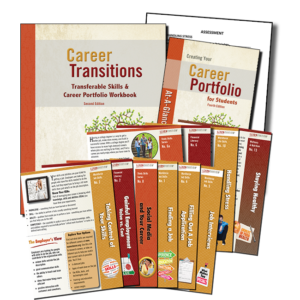
15 1-hour modules – Materials used include:
Six targeted pamphlets from our various pamphlet series.
A variety of handouts and exercises found in our Instructor’s Manual to supplement the session topic.
Exercises from The College Prep Workbook – a skills-focused workbook used to identify and document personal skills.
Creating Your Career Portfolio At-A-Guide for Students, 4th Ed.– Students will create a personal career portfolio to document their current skills, identify skill GAPs, and learn to use their career portfolio as a tool to compete for internships and jobs, scholarships, and promotions.
Don’t have time for a full boot camp or job camp?
Try the Mini Camps!
Job Camp Sessions
#1 - Are You Ready for College?
- Risk factors for college dropout
- How college works, laundry, health, money, building support systems.
- Overview of the College Boot Camp
- Are you ready to be on your own?
#2 – What is it You Want?
- Visualizing life during and after college
- Identifying target jobs and defining career paths
- Setting goals
- Introduce a Visioning Board project
- Career To-Do list
#3 – Being A Professional
- Knowing Your Skills
- What does it mean to be a professional?
- Professionalism survey
- The basics of knowledge, skills & abilities (KSAs)
- How classes transfer knowledge to skills
- Reading a syllabus to identify skills
#4 – Personal and Professional
- Well-Being
- How well-being impacts your personal life and
- professional career
- Purpose, Social, Financial, Community and Physical Well-Being
#5– The Career Portfolio Starter
- Overview of career portfolios
- How career portfolios are used to organize skills
- Building your skill lists
- Collecting work samples during college
#6– Getting What You Want, Not What You Get
- Choosing a major
- Skills needed for a target job
- Gap analysis – skills I have vs. skills I need.
#7– Managing Money
- Managing money in college
- Identify your spending habits
- Creating a college budget
#8– Learning the School Systems
- Student services
- Health services
- Academic counseling
- Financial aid
- Registrar’s office
- Housing & Recreation
#9– Risk or Reward… Activities, Friends, Parties, & Getting Involved
- Choosing clubs and activities
- Making friends
- Finding mentors
- Staying safe
- Balancing social and academic life
- Transferable skills
#10– Community Service & Connections
- Getting involved in the community
- In class volunteer experience
- Gaining skills from community service
- Networking
- Getting around in the community
#11– Handling Stress
- Stresses to expect
- Ways to relieve stress
- When to call home
- Building support systems
#12– Basic Study Skills
- Time management
- Basic study skills
- Balancing social and academic life
- Course load and homework realities
- Creating schedules
#13– Staying Healthy
- Basic wellness – sleep, nutrition, exercise
- Review current patterns of sleep, study, exercise
- Basic first aid
- Being sick – what to do
- When to push through, and when to get help
- Where to go for medical aid
#14– Setting Up Your First Room or Apartment
- What to expect
- Bringing the basics
- Getting along with roommates
- Managing laundry
- Basics of food safety
- Basic dorm cooking
#15– Getting A Part-Time Job
- Using a career portfolio to get a job
- When to focus on school and when to add in work
- Making summer jobs pay in skills that help your career
- Review college readiness
Short on Time? Try our Mini Camps!
Mini Boot Camp includes 9 sessions with pamphlets and assessment documents:
- Are you ready for College?
- Identifying Your Target Job
- Being a Professional
- The Career Portfolio Starter
- Paying My Bills
- Managing Stress
- Basic Study Skills
- Staying Healthy
- Setting Up Your Household
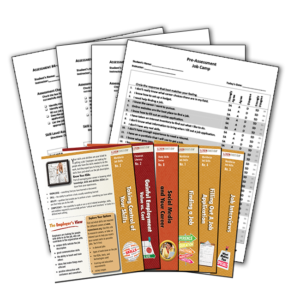
Mini Job Camp: includes 6 sessions with pamphlets and assessment documents:
- Taking Control of Your Skills
- Gainful Employment-Value vs. Cost
- Finding a Job
- Social Media and Your Career
- Filling out a Job Application
- Job Interviews
Ready to Purchase? – Purchase individual items or Bundle Packs!
Jump-Start College
5 key topics for students and parents when talking about college
The Jump-Start College set includes 5 pamphlets and assessment documents:
-
Are You Ready for College?
-
Being a Professional- Knowing Your Skills
-
Identifying Your Target Job
-
Gainful Employment- Value vs. Cost
-
Paying for Education
These are the 5 key things students and parents need to know when they start looking at college and post high school education. How to get ready now, how to decide on majors and careers, and how to pay for school.
Ready to Purchase? – Purchase individual items or Bundle Packs!
Creating Your Career Portfolio – Supplementing the Job and Boot Camps
Career Portfolios for Students, 4th Ed.
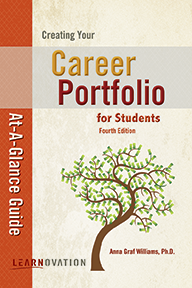 Used as part of the Job Camp curriculum.
Used as part of the Job Camp curriculum.
Recommended as a supplement for Boot Camp.
Creating Your Career Portfolio: At-A-Glance Guide for Students, 4th Ed.
The focus is on using skills from education, work experiences, internships, and activities to get a job, compete for internships, and scholarships, and use a career portfolio on the job. Focus is on identifying current skills, target skills needed for the job, and setting career goals to cover the gap between the two.
